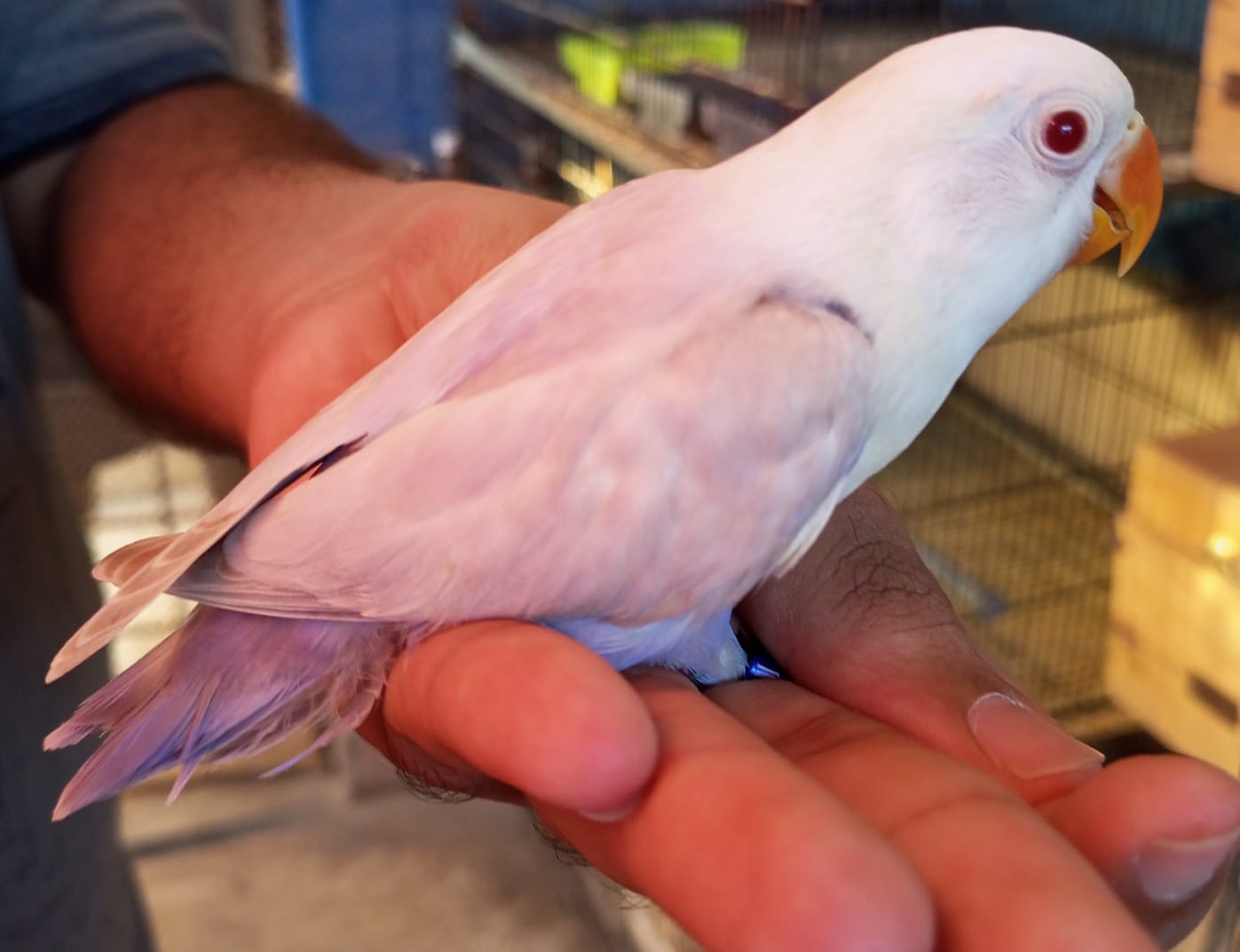
What Are Love Birds?

Beautiful creature’s lovebirds are little, multicolored parrots that are well-liked as a pets. They are famous for their loving deeds towards their companion, so they are called “lovebirds”. Lovebirds appear in a range of attractive colors, like yellow, green, red, blue etc are the most common available beautiful colors.
Lovebirds are community based social birds, need a bunch of concentration and interface to flourish in confinement. In the natural environment, lovebirds are inhabitant of South Africa where they exist in the forest in between trees of berries and yummy fruits.
Why Are They Known As Lovebirds?
Lovebirds are known as lovebirds for the reason of their sturdy social and loving conduct with their companions. Lovebirds are famous for forming friendly bonds with their allies and frequently continue to live together for a long time. They show a variety of fondness, such as giving out food to each other, embracing & hugging. They are also famous to be extremely voiced and speaking up, As well as will frequently be seated, peeping and produce soft soothing sounds. These attitudes have led to the frequent involvement of lovebirds amid worship and love .That is the brief reason behind calling them” lovebirds”.
Love Birds as a Much Loved Pet:

Lovebirds are always enormous pets for pet lovers, who are excited to create for them a suitable atmosphere and care that love birds deserve. Conversely, it’s imperative that love birds need a bundle of interface and concentration by their caretaker to prosper, flourish and blossom.
Relaxing Housing: Lovebirds want a confined comfort cage that should be large and adequate for birds to stir around, widen their wings and have fun. The cage is supposed to be set to the side in an airy fresh spot away from straight exposure of sunlight. They too need different types of perches, desired toys to play with, and a range of other nesting materials like nesting boxes to keep them enthused.
Birds Diet: Lovebirds want a reasonable diet including multiple types of fruits, seeds, and fresh vegetables. It’s essential to make available for them a good diet consisting of balanced nutrition to fulfill their body needs.
Socialization: These pets love to live in groups and want a bundle of communication and interface with their caretaker. They need frequent treatment, play, fun time, and chit chat with other lovebirds to keep them pleased and fit.
Training for Birds: Lovebirds can be skilled to do actions and understand simple instructions. Optimistic strengthening techniques, like treats and admiration, can be picked up to teach them.
Lovebirds & Health: Lovebirds can be vulnerable to a range of fitness and well being issues, like infections in their respiratory system, plucking of their feathers, and chubbiness. It’s significant to give them regular veterinary monitoring and fresh livelihood surroundings to avoid sickness.
In general, lovebirds are the best pets for the concerned care takers.
Really Lovebirds can Learn their Name?
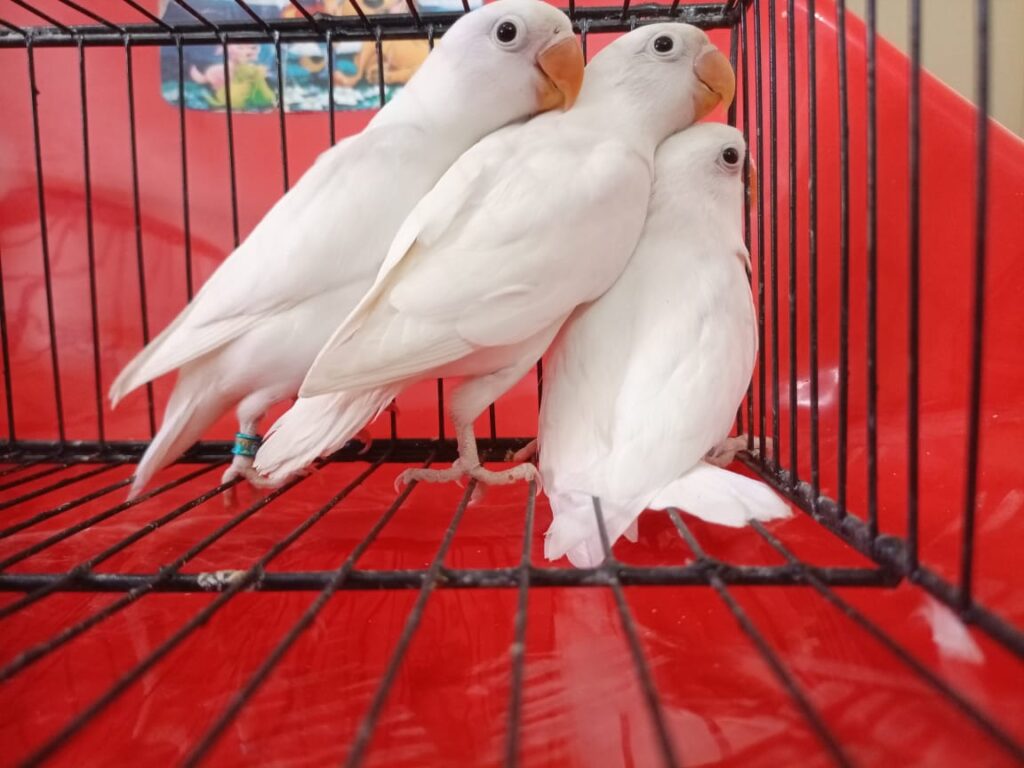
Yes of course, lovebirds are able to memorize their specific name after good training and recurrence. The basic lesson of a bird’s name is to employ optimistic strengthening techniques, like admiration and praising once they greet its name.
It’s quite simple to do, just begin by pronouncing the bird’s nickname visibly and clearly each time you do communicate with them. Slowly and gradually, by the time, the lovebird will start to connect the sound and start recognizing her name. You are capable of using a steady pitch of tone while speaking the name of the birds usually helps to strengthen the union and involvement.
When the bird has understood and recognized its name, you can utilize it to obtain its attentiveness. Be regular and steady with the name learning process, and all the time give a positive response to the bird when her name is called out.
What are the Pros and Cons of Lovebirds as Pets?
Lovebirds are well-known for their good-natured and inquiring qualities, and they are able to become magnificent pets for individuals who are enthusiastic to give them with the right care and concentration they want.
Best Pros:
Very Friendly: Lovebirds are recognized for their loving actions with their companions & in groups as well. And can shape sturdy bonds with their caretaker.
Good-Humored: Lovebirds are cheerful and inquisitive, and they get pleasure from exploring their surroundings and enjoying themselves with their toys.
Low-Maintenance: A special feature about love birds is that lovebirds do not need extensive space as some other birds usually require. So maintenance is not a big issue if you need to retain your love birds.
Long Natural Life: These loving birds are able to survive up to 17 years or more, if they are being provided proper health care, food and living space.
Cons:
Full Noisy: Lovebirds are loud, speak a lot and are voiced, particularly once they are looking to get your concentration or are facing mood swings.
Muddled & Messy: Lovebirds are usually cluttered eaters and can spread out foodstuff and fluff feathers into their cage living space.
Socially Active: Lovebirds are community based birds and desire a bunch of interface, communication and concentration by the caretaker owner. And if they don’t get proper attention, they might react and a behavioral issue arises.
Fitness Issues: These birds can face multiple health problems, like respiratory infections, plucking of feathers frequently, heaviness, fatness etc. They need standard routine checkup by the veterinary doctor to avoid these types of health related issues to avoid sickness.
Violent Behavior: Lovebirds can turn out to be destructive towards their companion birds or towards their owner’s side, if they sense endangered or need to be defensive. Good social working out and exercises helps to avoid that type of conduct.
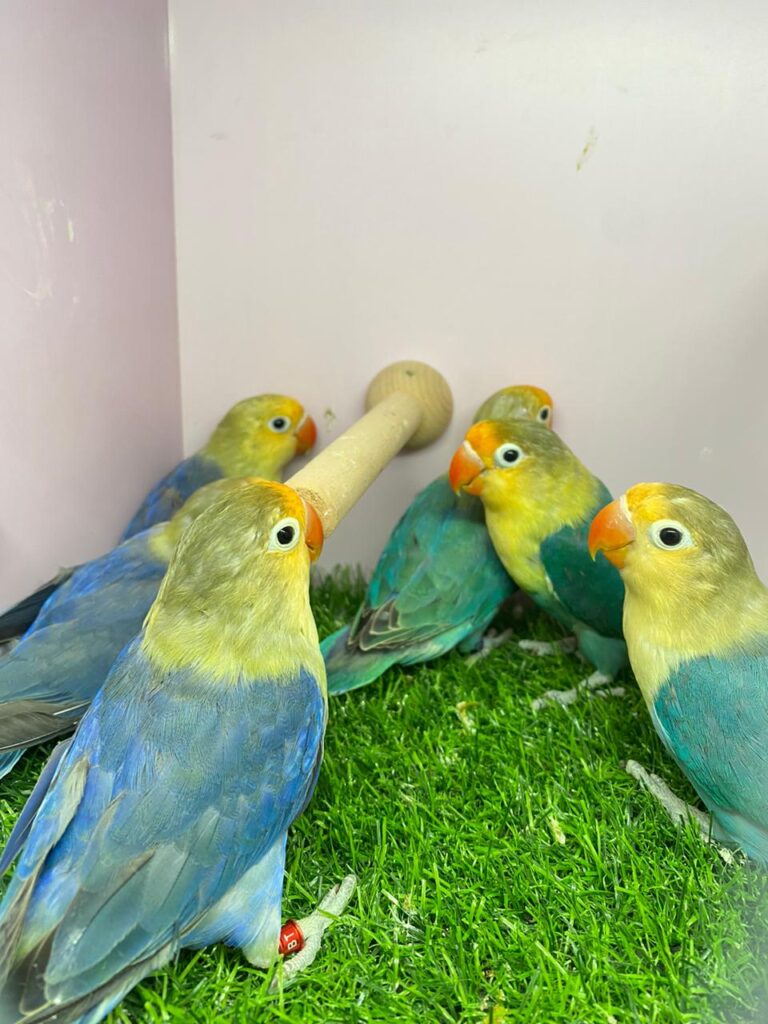
Lovebird’s Lifespan:
The natural life of an African lovebird is naturally spanned around 15 years to 17 years by means of suitable care. On the other hand, several lovebirds are known to survive and live for up to 18 years or sometimes more. A lovebird’s natural life is able to be inclined by multiple factors, including heredity, food eating habits and an atmosphere. To ensure that your blue lovebird lives a long and healthy life, it’s important to provide them a balanced diet, regular exercise, socialization, and a clean living environment.
Standard veterinary check-up also assists to discover and put off possible fitness issues that might create effects on your love bird’s pets.
Benefits of Lovebirds Care at House:
Keeping lovebirds at home can provide a number of benefits, including:
Friendship: Lovebirds are able to present their owners with companionship and affection. They are able to structure sturdy connections with their caretaker owners and get pleasure from interaction based socializing with them.
Hobby & Fun Entertainment: Lovebirds are good-humored and lively; they get pleasure from spending time with mirror toys as well as digging out more fun from their atmosphere. They are able to give their caretaker an hour of fun hobby and enjoyment.
Less-Maintenance Required: Compared to other parrots, African love birds don’t need large space, and are usually simple to care. They don’t want much concentration as several other pet birds usually needed, so these low maintenance feature make them a fine option for individuals to manage and keep them along with busy life schedule.
Learning: To have lovebirds at house brings enlightening knowledge for the whole family and especially for the kids. Discovering and detecting the bird’s actions and facts like their way of life gives an exposure to learn more about pet’s unique habits.
Recreation: To observe lovebird’s activities can be a soothing, calm doings and assist to decrease life pressures and worries.
In general, to have lovebirds at home can be a satisfying practice for persons who are eager to give them with the good care and concentration which birds required.
How do you Construct a Bird’s Protected Room?
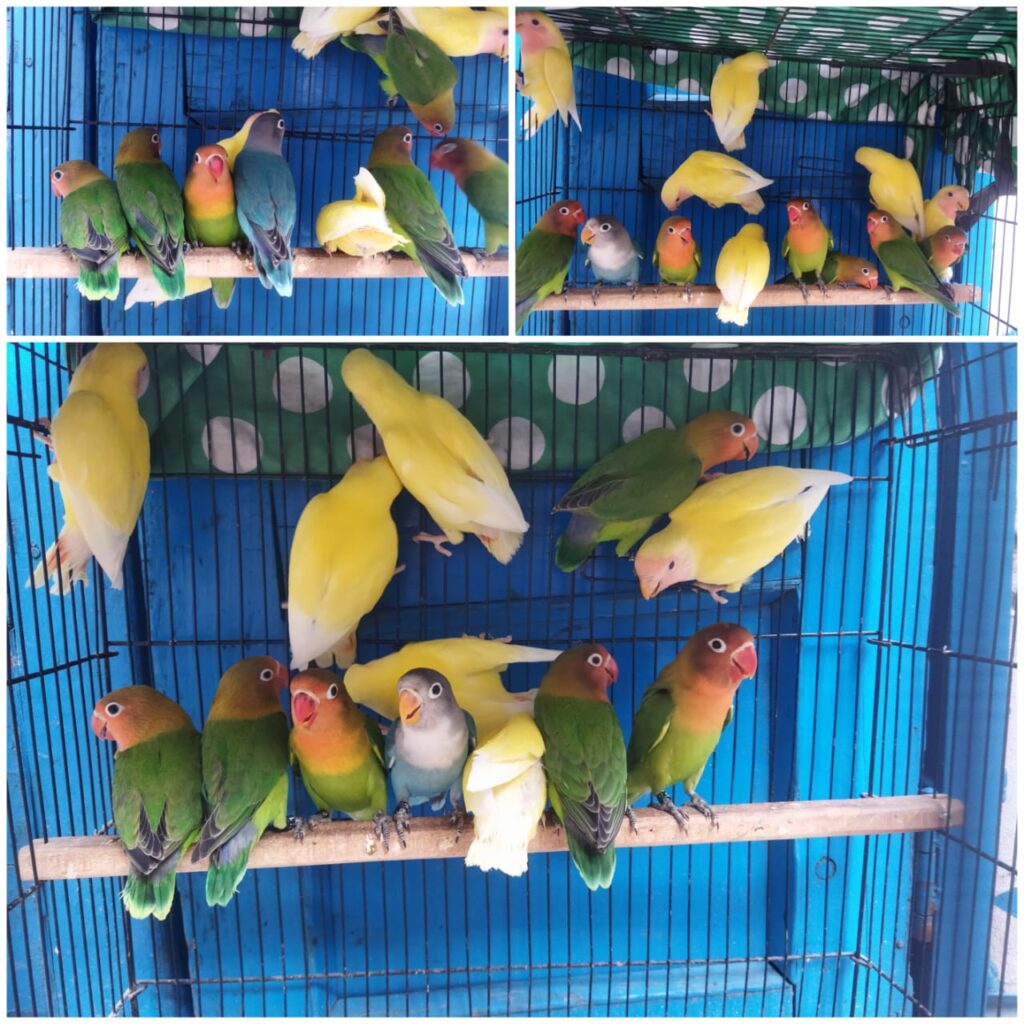
While making a bird’s room is vital to ensure the protection and happiness of your favorite bird. At this time we are floating some guidelines on how to craft a bird cage room space safe and secure.
Abolish Hazards: Take away any poisonous plants, clean-up chemicals, any type of wiring, and further possible hazards from the bird’s living space.
Windows: Put wrap up shades on the windows to escape lovebirds as of any unpleasant happening while moving around.
Cage Windows/ Doors: Be alert to close doors & windows to put off birds starting flying elsewhere. Cage doors need to be properly closed to avoid escaping of birds.
Bird’s Exposure to Air: Make sure presence of suitable airing in the cage to stop the upsurge of vapors, dirt and sand.
Flooring: Don’t use slippery or shiny flooring, as birds can easily slip and fall. Use a non-slippery and absorbent flooring material, such as carpet or linoleum.
Toys and Variety of Perches: Provide your pet bird’s different types of toys, perches, and multiple types of recreational fortification to keep them emotionally and physically enthused.
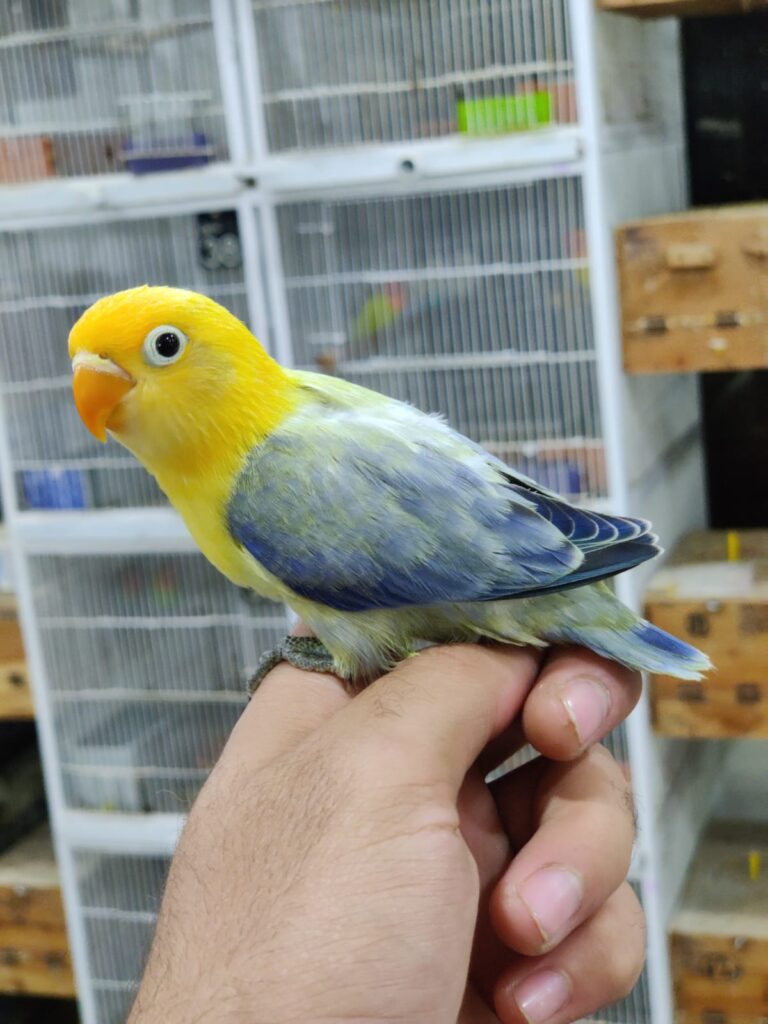
Ample Lights: Arrange ample lights for your lovebird’s, but keep them away from insertion of straight daylight, which can create sunburn.
Warmth: Place the cage at a pleasing temperature, preferably amid 65-75°F (18-24°C). Keep away your lovebirds to heating or air conditioner machines and cooling vents.
Cleanliness: Clean the bird’s cage regularly and clear the dirty mess frequently as well as nearby area of the cage need to be germs free always.
By these subsequent tips, you can generate secure and relaxed surroundings for your darling pet love birds within your residence.
In general, lovebirds are magnificent pet for persons who are eager to care for them correctly. Conversely, it’s vital to believe the possible challenges and tasks that appear with owning an African lovebird’s and bring them to home as a pet bird.
Best of Luck with Lucky Pet Lovebirds
